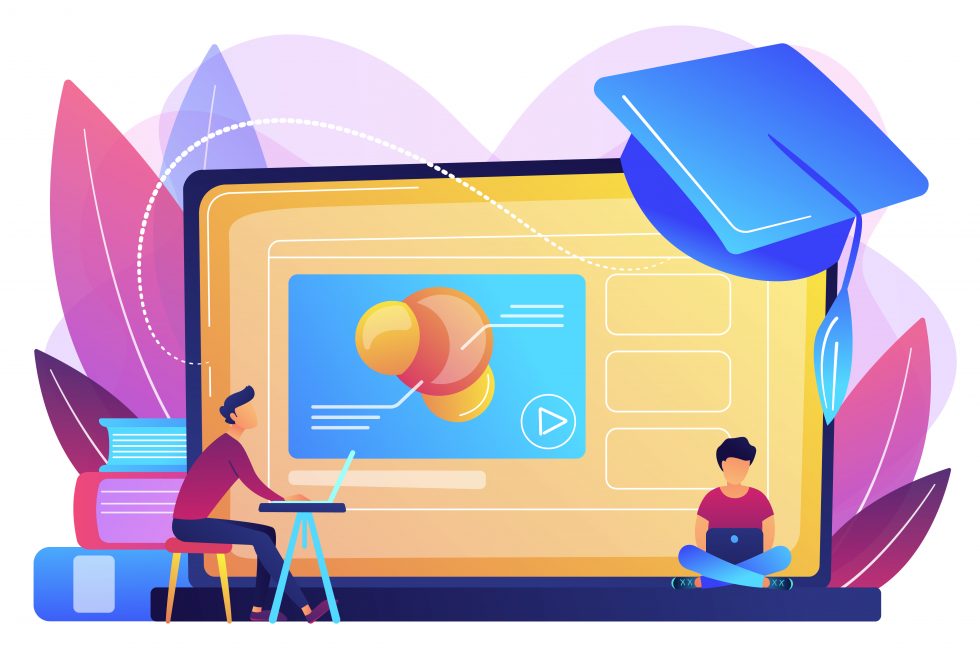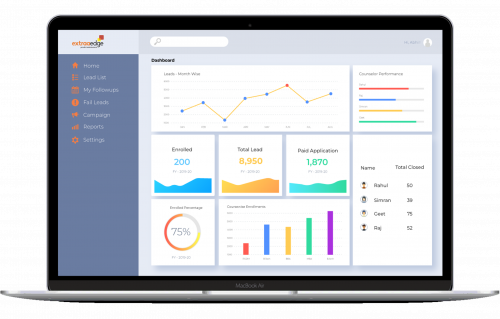5 Game-changing Technology Trends that are Transforming the Education Sector in 2021

The year 2020 and now 2021 have been major speed bumps for many. But they are also the reason why there is a sudden boom in technology for many industries. The pandemic has upended the way we work and drastically changed the way we teach and learn.
In the year 2019 – Big Data, Machine Learning, and the Internet of Things (IoT), were some of the biggest trends in education technology. However, in 2020 when the world had to go ‘online’, remote work management and digital learning have become the most prominent trends over others.
Due to social distancing, lockdowns, and restrictions, both teachers and students have had to get used to functioning through digital platforms. A trend that has continued to 2021. The main focus of the recent education technology trends is to ensure connectivity, versatility, effective collaboration, quality learning, increased productivity, and ease of use.
Top 5 Education Technology Trends of 2021
Traditional Classroom Teaching is Becoming Online
In the year 2020, remote learning became the top educational trend overnight! The rising COVID 19 cases and closures of educational institutes, led to the increase in demand for online educational platforms. Going the eLearning route, many education institutions shifted to electronic delivery of learning. Online education largely focused on content delivery through:
- Computers
- Laptops
- Tablets
- or even smartphones
This shift included moving to education methods as simple as live video calls, slide-based online activities, or moving to more robust systems like online courses, learning platforms to help students develop the necessary skills.
You can teach your students in real-time through live streams, group meetings using virtual conferencing tools such as Zoom or Microsoft Teams. Or you can have a more holistic and personalized approach to learning by using learning platforms such as Learning Experience Platforms (LXPs) and Learning Management Systems (LMSs). With these tools, learning can be self-paced and you can create an engaging student learning journey through:
- Interactive and animated videos
- Infographics
- Online and offline task-based activities
- Gamified Assessments
- Online Projects
Tuition and Coaching Classes are Going Virtual

Private tuition has become the in-thing among students and is considered to be one of the quickest rising industries in India. As per a report by the National Sample Survey Office, one out of every four students in India takes private tuition. In some states, the number is as high as 75%.
With remote learning becoming the norm, it is no surprise that online tuitions are a major hit across the globe. Taking inspiration from the edtech industry, which has been growing exponentially for the last couple of years, many coaching institutes have started to move towards a more remote way of learning by going virtual.
After analyzing the needs of the students and the requirement of virtual learning, coaching centers such as NEETprep have come up with special course modules for students. Zoom calls, Google classrooms, or even phone calls are some of the primary modes of teaching both tuition and coaching centers are using to ensure that online learning is effective. Many are taking the effort to develop communication and product features to make sure that students remain motivated and take the effort to pace themselves, set targets, and not give up.
Gamified Assessments are the New Exams
Many institutes are already using gamification as a method of teaching to keep students engaged and make learning more fun. Gamified learning helps create a funny and positive teaching environment for learners.
With its success in student learning, many have sought to create gamified assessments to assess a student’s performance. Instead of using the boring paper-pencil test formats to analyze how much a student has learned, many institutes are opting for more ‘fun’ game-based assessment approach.
As the name suggests, gamified assessments add the element of ‘games’ to an exam. They either repurpose a standard online assessment by giving it a story or design new assessments to include gaming elements. Due to their format, game-based assessments are very useful in keeping the students engaged and motivated. They come in many forms like puzzles, word games, crosswords, memory games, short quizzes, etc. They are usually quick, and because they are fun to do, these assessments remove the element of exam stress that many students go through during traditional exams.
Social Media is the New Way of Learning and Communication
![]()
Education institutes already understand the importance of social media in today’s world for connecting with their students. Many use platforms such as Facebook and Instagram to engage with their students by organizing contests, alumni meets, and webinars.
But, did you know? You can use social media as a part of the learning process! Your students belong to the tech and social media savvy generation. Considering this as a golden opportunity, many educational institutes have started using social media as a communication tool to ensure that students can interact with others easily.
These platforms can be used both by teachers and students to share study materials, have group discussions, post content about new learnings, and exchange views by commenting on someone else’s post.
Many organizations like TedEd use social media to share educational information in the form of animated videos that go viral. You too can upload informative videos, create lessons on Youtube and Facebook, which your students can find, easily access, and share the content with their friends.
With social media you can:
- Broadcast updates and alerts
- Stream live lectures and host discussions
- Assign blog posts as essays
- Conduct peer-to-peer learning sessions on your pages
Education CRMs are the Future of Admission Management

Almost every industry uses a CRM to manage their leads. CRMs for education enable institutes to streamline their communications and track and report on an individual’s admission journey towards enrollment.
With the increasing shift to a remote life, many educational institutes have been opting for Education CRMs to make their virtual work more seamless. The tool has been effective in helping many with connecting and engaging with students virtually through video counselling and automated personalized communication. They have also been using education CRMs for remote work management of their admission teams.
We at ExtraaEdge have witnessed this change ourselves. In 2020 alone, we have onboarded over 120 clients who have seen great results. The number has been steadily growing since then.
An education CRM is a software specially designed to help the education industry manage their entire student journey – from inquiry to enrollment. You can use an education CRM in multiple ways:
- Effective inquiry management from multiple sources like social media, website, phone, chats
- Automation of tedious manual administrative and operational tasks
- Easy data segmentation
- Sending bulk communication through multiple channels
Conclusion

While a few believe that this rapid and unplanned move to a remote way of functioning – with no preparation, lack of knowledge and training, and insufficient bandwidth – can result in poor student experience. Many believe that these new models of learning and student management have significant benefits and will revolutionize the education industry!


